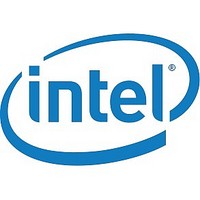KIXDP2805TAA Intel, KIXDP2805TAA Datasheet - Page 4

KIXDP2805TAA
Manufacturer Part Number
KIXDP2805TAA
Description
Manufacturer
Intel
Datasheet
1.KIXDP2805TAA.pdf
(8 pages)
Specifications of KIXDP2805TAA
Lead Free Status / Rohs Status
Not Compliant
‡
additional specifications for the fabric interfaces specified in PICMG 3.1
for Ethernet, PICMG 3.2 for InfiniBand, PICMG 3.3 for Star Fabric, and
PICMG 3.4 for PCI Express/Advanced Switching.
The Intel IXMB2805 and IXMB2855 base cards include a
SPI-4 to SPI-3 bridge ASIC (a component of the Media
Access Module shown in Figure 1) that provides one
SPI-4 interface and three SPI-3 or UTOPIA-3 ATM/POS
mezzanine/fabric interfaces. Each mezzanine interface is
serviced by a dedicated 32-bit SPI-3 bus that enables data
plane traffic between the I/O modules and the network
processor. The SPI-3 bus operates at speeds up to 133 MHz
and supports both SPHY and MPHY addressing in SPI-3 and
UTOPIA Level 3 formats. In addition to the two I/O module
mezzanine sites, a third dedicated SPI-3 bus provides a
high-speed communication path to support Gigabit Ethernet
traffic over the AdvancedTCA-compliant backplane. An Intel
82546EB GbE Controller is included to provide connectivity
from the PMC mezzanine to the AdvancedTCA Base or Fabric
Interface. It also provides a connection from the network
processor to the Base Interface via PCI to Gigabit Ethernet.
Where additional memory or processing headroom is desirable,
the base cards support optional QDR-II memory or Ternary
Content-Addressable Memory (TCAM) to offload tasks such
as table lookups.
Base cards connect to the base interface on the backplane
and communicate with other boards in the chassis over
10/100/1000 Base-T ports. They also offer an option for a
Fabric Interface Card (FIC) to connect to the fabric interface
of the backplane.
The base cards also include an IPMI v1.5-compliant Board
Management Controller (BMC) that communicates with
the SMM using IPMI protocol over the backplane IPMB
interconnect. This feature, along with the shelf manager,
provisions system management using standard interfaces
such as Remote Management Control Protocol (RMCP),
Common Information Model (CIM), Lightweight Directory
Access Protocol (LDAP), Simple Management Network
Protocol (SNMP), and HTTP.
To speed development time, base cards include the following
debug features:
• Two UART serial ports for board support package debugging
• 10 Base-T Ethernet MAC providing an IP-based development
• Metrowerks NetROM* connector to facilitate code
• JTAG header provided for flexible debug testing and
PICMG defines the Base Interface in the PICMG 3.0 specification with
environment
development
boundary scans
‡
®
4
Mezzanine Cards
A selection of modular mezzanine cards addresses a broad
range of LAN and WAN I/O interfaces and enables simultaneous
control plane and data plane development. The choice of I/O
mezzanine cards includes Quad OC-3/OC-12, Quad GbE,
and single OC-48 and a 16-MB QDR-II memory module.
Additional cards such as a TCAM and control plane processor
cards are available from third parties.
Advanced Development Platform Software
Boot Monitor and Diagnostics
These advanced development platforms support startup
features prior to operating system load, providing assurance
that the system is properly configured and operational. A
basic power-on self-test is performed at power-up to detect
memory and processor errors before more complex operations
are enabled.
Standard diagnostics assist in the configuration of blades
and validate that all communication paths are operational.
Extended diagnostics can be developed and downloaded to
the platform through the Ethernet console port. Full source
code and design information is provided for the Intel modules.
The boot monitor for the IXDP2805 and IXDP2855 Advanced
Development Platforms is based on the industry standard
RedBoot* from Red Hat*. The boot manager enables developers
to load alternate versions of applications, diagnostics, and the
operating system to fine-tune the capabilities of the platform.
These images can be stored in the onboard flash memory or
downloaded through the Ethernet port from the customer’s
development host.
Board Support Package and Linux* Support Package
These advanced development platforms offer a choice
of Wind River VxWorks* or MontaVista* Linux operating
systems, each providing a comprehensive board support
package. Intel provides additional driver support for the
extended features of the base cards and optional media
mezzanine interfaces including baseboard, ATM/POS, and
Gigabit Ethernet drivers, as well as management interface
libraries to enable communication between the network
processor and base management subsystem.
Please contact Wind River Systems (www.windriver.com) or
MontaVista (www.mvista.com) directly for additional details.







